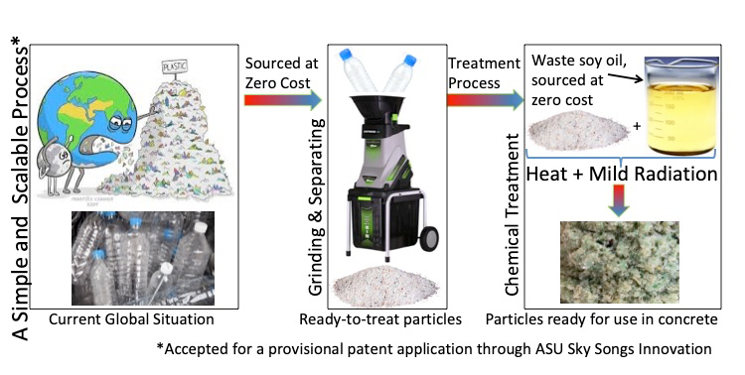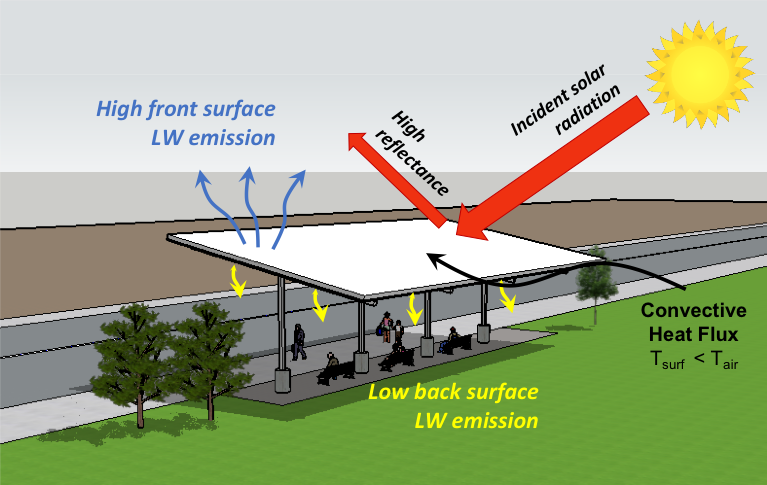ASU and Zimin Foundation partner for future of urban tech

Sustainable, smart cities incorporate wide-reaching, interconnected technologies to improve infrastructure, transportation, resource efficiency, health, security and more. The new Zimin Institute for Smart and Sustainable Cities, in partnership with the Zimin Foundation, will help support applied research projects to drive a people-centric vision for the future of cities. Image courtesy of Shutterstock
Cities generate the vibrant energy of society. However, they’re also the center of some of our most pressing sustainability issues — air and water pollution, urban heat islands, disease or security threats, and an increasing demand for resources.
Arizona State University’s four campuses are in the heart of the Phoenix metropolitan area — the fifth-largest city in the United States. The region surrounding ASU faces similar issues to many of the world’s megacities, such as extreme climate and resource limitations. Aware of these challenges, the university has a mission of being socially embedded and leveraging its place to transform society. Researchers in the Ira A. Fulton Schools of Engineering and many other schools at ASU are employing an entrepreneurial mindset and applied, use-inspired research to engineer and validate solutions that serve communities.
Sustainable, smart-city technologies represent a unique opportunity to create solutions that advance urban areas and the well-being of their inhabitants by addressing the potentially harmful effects of the built environment.
An opportunity to work with the most innovative university on smart-city technology was the impetus for the Zimin Foundation to partner with and support ASU and the Fulton Schools on the second international Zimin Institute, focusing on future technologies that enable smart and sustainable cities.
“The selection reflects on ASU’s growing reputation as an innovation powerhouse and an agent for positive societal change and impact,” said Kyle Squires, dean of the Fulton Schools.
“With this gift, the new institute has a tremendous opportunity to energize the ASU community of scholars and innovators to lead the creation of new smart-city technology solutions, to catalyze new active collaborations with regional stakeholder public and private partners and ultimately to be a world leader in the smart and sustainable cities arena.”
Zimin Foundation provides resources to advance society through innovation
The Zimin family has historically focused its philanthropic efforts on supporting science and education in Russia. Their not-for-profit organization, the Zimin Foundation, recently extended its activities to other countries, with the first Zimin Institute established at Tel Aviv University in 2018 and now ASU in 2020.
“The Zimin Foundation and ASU share the vision of achieving high impact by supporting projects with visible real-world effects,” said Mark Shmulevich, head of Zimin Institutes at the Zimin Foundation. “ASU will be able to match the experience of their researchers and their research partners with the opportunities to quickly apply sustainability and smart-city innovations.”
The vision of the Zimin Institute for Smart and Sustainable Cities at ASU is to drive people-centric smart cities of the future — integrating advanced technologies into the physical spaces where people live, work, learn and play to enhance security, health, sustainability and resilience.
The first challenge of creating smart, sustainable cities is their wide-ranging, difficult-to-define yet appealing promise, said Gregory Raupp, director of the new Zimin Institute for Smart and Sustainable Cities at ASU and Fulton Schools Foundation Professor of chemical engineering. With so many components and stakeholders, Raupp says “the only logical and effective strategy to address the challenges is through a combination of targeted, use-inspired research leading to technological innovation and collaboration between public organizations and private enterprises.”
“A city, smart or otherwise, is an incredibly complex system of systems of systems,” Raupp said. “We must integrate and weave all of the technology solutions into a cohesive fabric that works seamlessly and effectively to make a genuinely smart city, one that increases the level of health, happiness, contentment and personal enrichment of all its citizens — a place where we would all want to live.”
The new Zimin Institute at ASU will identify transformative technologies, connect researchers for interdisciplinary collaboration, fund nascent technology solutions, leverage ASU and local innovative testbeds and initiatives, grow the smart-cities entrepreneurial ecosystem through venture funding, and engage with the community and stakeholders to ensure solutions coming out of the institute create value.
“The Zimin Institute at ASU will financially support several projects every year on a competitive basis,” Shmulevich said. “It will also allow the project teams to tap into the Zimin Foundation network of researchers, tech experts and laboratories. We believe that interdisciplinary teams of researchers often generate the best innovations. We strongly encourage such collaboration. The most successful projects will be able to tap on the Zimin Foundation support in the later stages of their innovation journey.”
In 2020, projects of interest focus on human connection, sustainable and healthy environments, public safety and well-being, and infrastructure resilience. The Zimin Institute is open to consider supporting compelling new projects that may be considered too risky for conventional funding avenues.
Raupp is pleased with the first four projects that have been selected for support by the Zimin Institute technical advisory and executive advisory boards. They address multiple facets of the future of smart cities, from sustainable building materials, the urban heat island and air quality to support for people living with Alzheimer’s disease and their caregivers. [Read more about the projects on Full Circle.]
“These projects are all tackling immensely important problems that are, unfortunately, growing in their scale and intensity,” Raupp said. “In addition, it is gratifying to see that the projects cement new, exciting collaborations with external organizations.”
The selected projects are at a diverse range of stages from visioning and ideation to technology prototypes and field testing.
“It’s a great start,” said Boris Zimin, chairman of the Zimin Foundation. “Our vision is to be able to support the most promising innovation projects that bring lab findings into the world, helping people globally. We wish the best of luck to the first winners of our grant call at ASU and will keep doing our best supporting them.”
Continuing support for applied research solutions
The Zimin Foundation leaders look forward to what will happen through these projects in the next few years. Foundation representatives will regularly interact with the project researchers and introduce them to their network, enabling the teams to learn and share best practices of translating research into real-world use.
When these four projects reach the prototyping phase or the researchers want to create spinoffs from their research, the Zimin Foundation will consider extending its support.
“We plan to hold three selection cycles and then an in-depth review of the progress of all the supported projects,” Shmulevich said.
Zimin Foundation support is not limited to engineering researchers — faculty members from across ASU can apply for Zimin Institute funding with projects at any stage of development. The institute will prioritize solutions headed toward implementation, deployment or commercialization within five years.
“The Zimin Institute at ASU provides a unique funding opportunity that’s intended to bridge gaps in translating research to commercialization, essentially to fund new, exciting ideas and solutions for which it might otherwise be difficult to secure additional funding, while establishing new, productive collaborations and partnerships,” Raupp said. “Any professor looking for a path to commercialization for their smart-cities research is welcome to apply for funding.”
Faculty members interested in applying for Cohort II funding can visit zimin-institute.asu.edu for more information, or contact Project Manager Lisa Irimata at lirimata@asu.edu or Zimin Institute Director Greg Raupp at raupp@asu.edu for specific questions.
More Science and technology

Hack like you 'meme' it
What do pepperoni pizza, cat memes and an online dojo have in common?It turns out, these are all essential elements of a great…

ASU professor breeds new tomato variety, the 'Desert Dew'
In an era defined by climate volatility and resource scarcity, researchers are developing crops that can survive — and thrive —…

Science meets play: ASU researcher makes developmental science hands-on for families
On a Friday morning at the Edna Vihel Arts Center in Tempe, toddlers dip paint brushes into bright colors, decorating paper…





